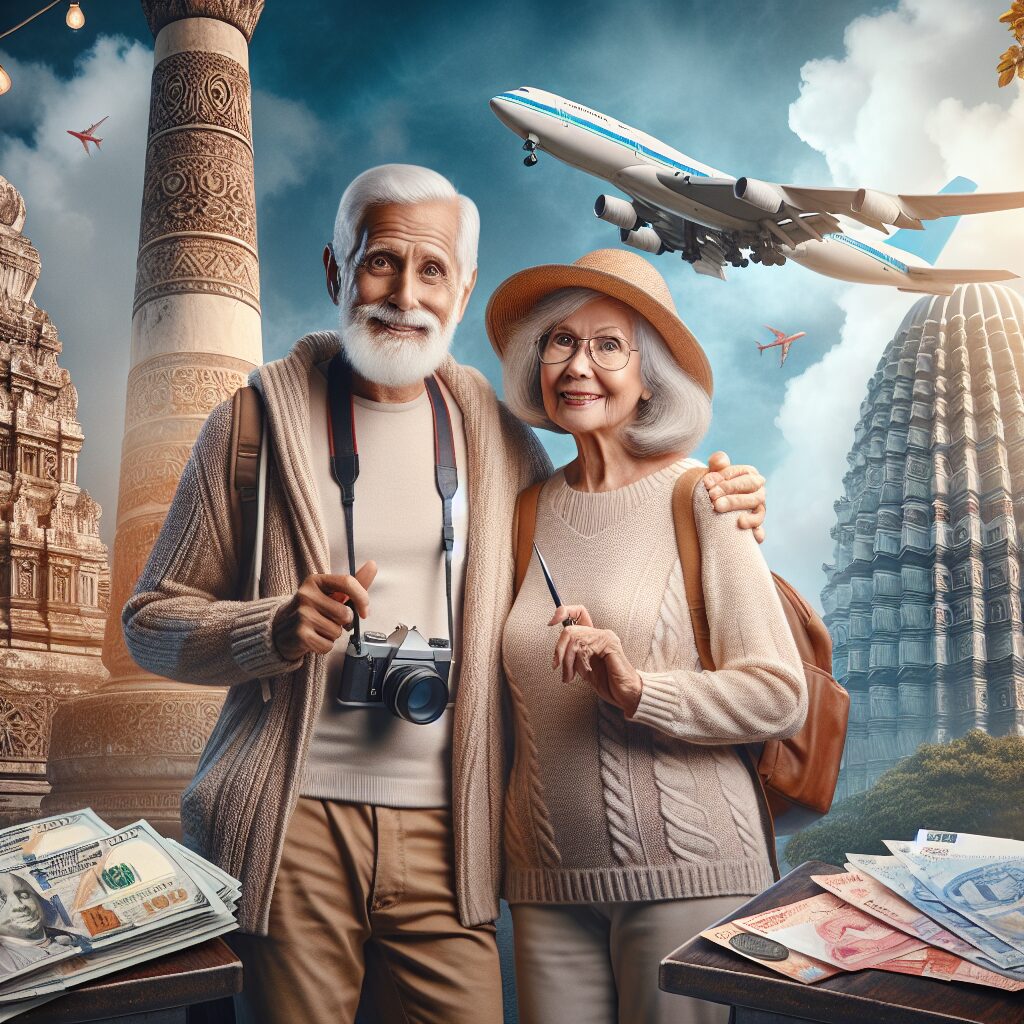Senior travelers are a growing demographic in the world of travel. Defined as individuals aged 65 and above, these adventurous individuals are setting out on international trips to explore new cultures, indulge in unique experiences, and create lasting memories. It is fascinating to note that senior travel has witnessed a sharp rise in recent years, with retirees embracing the idea of embarking on international adventures. This trend has had a significant impact on the travel industry, leading to the development of tailored services and experiences that cater specifically to the needs and preferences of senior travelers. From senior-friendly accommodations to specialized tour packages, there are a plethora of options available that ensure a seamless and enjoyable travel experience for this discerning group.
When it comes to senior travel, there are certain unique features and impacts worth highlighting. One of the most notable aspects is the emphasis on comfort and convenience. Senior travelers often prioritize accommodations and transportation options that offer easy accessibility and comfort, ensuring a hassle-free journey. Moreover, senior-friendly guided tours and activities that accommodate physical limitations while still providing an immersive cultural experience are in high demand. This niche market has led to the development of specialized tour operators and travel agencies that cater specifically to senior travelers, offering tailored itineraries and expert guides who are well-versed in addressing the unique needs and interests of this demographic.
In the upcoming sections, we will delve deeper into the key takeaways for senior travelers looking to embark on international adventures. From essential travel tips and precautions to consider, to destination recommendations and must-try experiences, this guide will provide invaluable insights to ensure an unforgettable journey for senior explorers. So, let’s dive into the world of senior travel and uncover the secrets to a fulfilling and enriching international adventure.
Key Takeaways
1. Senior travelers can enjoy international adventures by carefully planning their trips and taking certain precautions. It is important to research destinations, check travel advisories, and ensure that accommodations and transportation are senior-friendly.
2. Health and safety should be a top priority for senior travelers. It is recommended to consult with a healthcare professional before embarking on a trip, ensure that all required medications are packed, and have a comprehensive travel insurance policy that covers pre-existing conditions.
3. Senior travelers should consider their physical limitations and choose activities and destinations that suit their abilities. It is advisable to engage in low-impact activities, opt for guided tours, and select destinations with easy access to medical facilities and senior-friendly amenities.
4. Cultural sensitivity is crucial when traveling internationally. Seniors should respect local customs and traditions, follow dress codes if necessary, and be aware of appropriate behavior in different cultural settings. Engaging with locals and learning a few key phrases in the local language can enhance the travel experience.
5. Senior travelers should be cautious about their personal belongings and money. It is recommended to carry a money belt or secure bag, be aware of common scams targeting tourists, and keep important documents and valuables in a secure location. Staying vigilant and using common sense can prevent unfortunate incidents during a trip.
How can Senior Travelers make the most of their International Adventures?
1. Choose Senior-Friendly Destinations
When planning an international adventure, it’s essential for senior travelers to select destinations that cater to their needs. Opt for countries with senior-friendly infrastructure, such as accessible transportation systems, accommodations with elevators and ramps, and medical facilities nearby. Research about the destination’s safety, healthcare system, and availability of senior discounts to make an informed choice.
2. Pack Wisely and Travel Light
Senior travelers should pack strategically for their international adventures. Consider the climate and the activities you’ll engage in during your trip. Pack comfortable clothing and supportive footwear. Remember to carry any necessary medications along with their prescriptions. Traveling light will make your journey more comfortable, so only bring essentials and consider investing in lightweight luggage with wheels.
3. Plan Ahead and Take it Slow
Planning ahead is vital to ensuring a smooth international adventure. Research and create an itinerary that includes senior-friendly activities and attractions. Allow ample time between activities to avoid feeling rushed and overwhelmed. Be mindful of your energy levels and prioritize your must-see destinations. Remember, taking it slow will allow you to fully immerse yourself in each experience.
4. Consider Group Tours or Guided Trips
Joining group tours or opting for guided trips can be particularly beneficial for senior travelers. These organized adventures provide professional guidance and companionship throughout the journey, alleviating stress and ensuring a worry-free experience. Additionally, group tours often offer senior-specific itineraries and activities tailored to their interests and abilities.
5. Stay Healthy and Fit
Prioritize your health and fitness before embarking on an international adventure. Consult your healthcare provider to ensure you’re in good shape for travel. Carry necessary medications, medical documents, and emergency contacts. Maintain a balanced diet during your trip, staying hydrated and avoiding excessive alcohol consumption. Engage in activities that promote mobility, such as walking tours or yoga classes.
6. Learn about Local Customs and Etiquette
Before heading to a new destination, take the time to learn about the local customs and etiquette. Familiarize yourself with their greetings, gestures, and any cultural practices that may differ from your own. Being respectful and sensitive to local traditions will enhance your interactions with locals, making your international adventure more enriching and enjoyable.
7. Stay Connected and Safe
While exploring international destinations, it’s crucial to stay connected and ensure your safety. Carry a mobile phone with local emergency numbers programmed, as well as the contact details of your accommodation and tour guides. Stay aware of your surroundings and avoid displaying valuable items. If possible, travel with a buddy or inform someone back home about your itinerary for added security.
What are some useful tips for Senior Travelers venturing on International Adventures?
- Stay flexible with your itinerary, allowing room for rest and recovery.
- Research and invest in travel insurance that covers senior-specific needs.
- Try local cuisine but prioritize hygiene and dietary restrictions.
- Take breaks during long journeys to stretch and prevent discomfort.
- Engage in cultural activities such as attending local festivals or visiting museums.
- Be patient and understanding when faced with language barriers.
- Carry a photocopy of important travel documents and leave copies with a trusted contact.
- Connect with other senior travelers through online communities for tips and recommendations.
- Embrace the adventure and enjoy every moment of your international experience!
Frequently Asked Questions
1. Can senior travelers still enjoy international adventures?
Absolutely! Age is just a number, and senior travelers can still have incredible international adventures. With careful planning, considerations for personal health, and choosing suitable destinations and activities, senior travelers can have a memorable and fulfilling travel experience.
2. Are there any special travel requirements for senior travelers?
While there are no specific travel requirements for senior travelers, it is advisable to consult with a healthcare professional before embarking on an international adventure. They can provide guidance on vaccinations, medications, and any necessary health precautions based on your individual needs.
3. How can senior travelers ensure their safety while traveling internationally?
Safety is always a priority, regardless of age. Senior travelers can take several measures to ensure their safety while traveling internationally. These include researching the destination beforehand, staying informed about travel advisories, securing travel insurance, keeping important documents secure, and being vigilant about personal belongings.
4. Are there any travel destinations that are particularly suitable for senior travelers?
Yes, there are numerous travel destinations that cater to the needs and preferences of senior travelers. Destinations with good healthcare facilities, easy accessibility, senior-friendly infrastructure, and a variety of leisure activities are often popular choices. Some examples include European countries like Italy, Spain, and Ireland, as well as destinations in Southeast Asia like Thailand and Vietnam.
5. How can senior travelers make the most out of their international adventures?
To make the most out of international adventures, senior travelers can take a few steps. They can create a flexible itinerary, allowing for rest days or shorter activity durations. They can also focus on experiences that align with their interests and passions, such as culinary tours, cultural excursions, or photography workshops. Additionally, connecting with local communities and fellow travelers can enhance the overall experience.
6. What should senior travelers pack for international adventures?
The packing list for senior travelers embarking on international adventures will vary based on the destination and personal preferences. However, essentials typically include comfortable clothing and footwear, medications, a first aid kit, necessary adaptors for electronic devices, sun protection items like hats and sunscreen, and a copy of important documents like passports and insurance information.
7. Are there any senior travel groups or organizations that offer assistance?
Yes, there are various senior travel groups and organizations that specifically cater to the needs of senior travelers. These groups offer resources, advice, and sometimes even guided tours tailored to the interests and requirements of seniors. Some well-known organizations include ElderTreks, Road Scholar, and Solo Travel Network.
8. Is it possible for senior travelers to handle language barriers in international destinations?
Language barriers can be overcome with some preparation. Senior travelers can consider carrying a pocket-sized language translation book or using translation apps on their smartphones. Additionally, learning a few basic phrases in the local language, such as greetings or asking for directions, can go a long way in bridging communication gaps and showing respect for the local culture.
9. How can senior travelers find suitable accommodation for their international adventures?
When searching for accommodation, senior travelers should look for options that prioritize comfort and accessibility. Hotels with elevators, rooms on lower floors, and amenities catered towards an older demographic, such as handrails or non-slip surfaces, are often suitable choices. Additionally, reading reviews and checking for senior-friendly features on travel websites can ensure a more comfortable stay.
10. Are there any specific tips for senior travelers to manage long-haul flights?
Long-haul flights can be more challenging for senior travelers, but there are ways to make them more comfortable. Senior travelers can request special assistance, like wheelchair service or priority boarding, which airlines often provide upon request. Staying well-hydrated, moving around the cabin periodically, wearing comfortable clothing, and following exercises provided in airline magazines to improve blood circulation can also help alleviate discomfort.
Final Thoughts
Embarking on international adventures as a senior traveler can be an enriching and transformative experience. It offers an opportunity to explore new cultures, unwind in breathtaking landscapes, and create precious memories. With the right planning, considerations for health and safety, and an open mindset, senior travelers can embark on incredible journeys that defy age and inspire a sense of wanderlust.
Remember, age should never limit one’s desire for exploration and discovery. The world is vast, and there is always something new to be experienced. So, embrace the spirit of adventure and embark on international adventures with confidence, knowing that every step you take will lead to unique and fulfilling moments. Happy travels!



